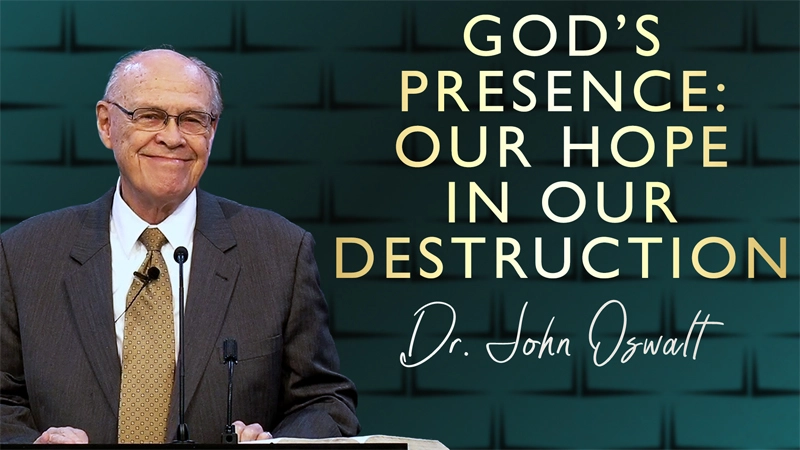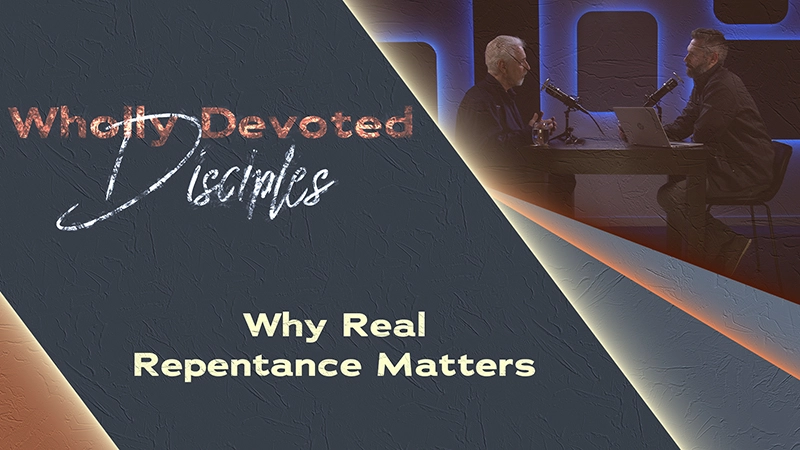
Five Marks of True Conversion
When it comes to the Christian faith, there is perhaps no issue more critical than whether a person is truly saved. Pastor Steve Gallagher defines for us, from a biblical perspective, what true conversion to the Lord Jesus looks like.
Mike: Pastor Steve, one of the issues you tackle in your book Standing Firm Through the Great Apostasy is how to answer what is arguably the most crucial question a person could ask: “What is real conversion to Christ?” What motivated you to write about this topic?
Pastor Steve: What I talk about in the book is that, although you can classify humanity in a lot of different ways, when it comes to spiritual matters, there's really only two groups: those who have been converted and those who are unconverted. But in Christendom, we find a third group a group of people: those who insist on there being this gray area between the converted and unconverted. In other words, they have never been converted to Christ, but they act as though they have. And really, the bottom line is that they want the benefits of Christianity without really submitting their lives to God.
Mike: What is it about this "third group" in Christendom that you're describing that places them outside the realm of what you would call true conversion?
Pastor Steve: A convert is someone who has basically thrown up the white flag and surrendered their heart and life to God. But what we see in the lives of many people in the church is those who have been altered into Christianity rather than being converted into Christianity. In other words, they've altered some outward aspects of their life: they go to church, they don't cuss anymore, et cetera. They kind of fit their life into the outward form of evangelical Christianity, but their inward parts have not been changed. Conversion is something that happens in the heart. And if it’s only taking on an outward lifestyle, then the heart has not been converted.
Mike: In Standing Firm Through the Great Apostasy, you describe five distinct elements of true conversion, although you point out that they might not necessarily happen in a particular order. Can you list these elements of conversion and give a description of what they look like?
Pastor Steve:
1. There is conviction and the fear of God.
One of the great realities of humanity that is expressed over and over again in Scripture is the depravity of mankind—that something is terribly wrong, and therefore something dramatic must happen inside. Well, for a person to realize that something's wrong, they need an agency outside of themselves to bring that reality into their heart. And that is what the Holy Spirit does. Jesus said that the Holy Spirit's function is "convict the world concerning sin." (John 16:8) And that conviction of sin is what leads the unbeliever to see his need to change.
What we're seeing in the church is a lot of promises: "Hey, if you'll join Christianity, you'll get heaven, you'll get blessings, you'll get all this. Just start coming to our church." And very rarely do you hear the kind of preaching that causes unbelievers to see their need for repentance—to say, "Something is wrong in my life; I have sinned against a holy God; I have been in rebellion against his authority, and I am wrong and need to change my life." Just saying, "Sorry; I messed up," is a very weak form of repentance, and I don't believe that kind of repentance brings someone into a saving faith.
2. There is spiritual enlightenment.
We've all heard the phrase that a person has "seen the light." And I think a lot of people in the church have experienced spiritual enlightenment, where something has opened up in their mind to make them aware of the spiritual realm. They understand that there is a God. But that doesn't equate with conversion; it's only part of the process of conversion. And the problem is that a lot of people stop right there and go no further, and they mistake that as conversion.
3. There is poverty of spirit.
Poverty of spirit is when you come to that point where you realize that you need to be saved but you realize that you cannot do it on your own—that you can't make yourself good enough, you can't obey all the rules, you are hopeless. You realize, therefore, that you need someone who can step in and wash you clean of all the filth of your sins and breathe life into you that can help you live the Christian faith.
This issue of poverty of spirit is why the Pharisees had such a hard time coming into Christianity. They had years of self-effort that they did not want to let go of, and there's so many people that have been raised in the church environment and that don't want to let go of their own goodness. So they never go through "the narrow gate;" (Matthew 7:13) they rest their Christianity upon their own works. Let's face it: if you go all the way back to the garden, we do not like acknowledging we're wrong. Humans hate to say they're wrong. But to go through the narrow gate of repentance, you have to acknowledge that something is terribly wrong in your life. Jesus used the story of the prodigal son to illustrate what a real conversion looks like. This young man lived for himself, and then, in the pig pen, he came to his senses. That's a picture of spiritual enlightenment and poverty of spirit: you're coming to the reality that you don't have it and that you need it. But that isn't the conversion yet. Really, the conversion is seen in his two proclamations, "I have sinned, and I am not worthy." You sense the ownership and the responsibility he's taking for his guilt. He's acknowledging that he has been a sinner and is not worthy of salvation, and he's throwing himself at the feet of God.
4. There is submission and surrender.
{{blog-bwalk="/blog-ads-storage"}}
This element of conversion also comes forth in the story of the prodigal son. After he made his confessions, he said, "Make me as one of your hired men," and when he made that statement, he was saying, "I will spend the rest of my life as your servant, doing not my will but your will." That is a sign of a real conversion. So often, the key issue for men who come to our Residential Program is whose will is going to rule in their lives. And it takes them usually a few weeks of being in a very spiritual environment and of really seeing the truth of this spiritual reality before they get to the point of being willing to lay down their arms and surrender to God. We talked earlier about depravity, and the root of depravity is our own self-will. That's the bottom line. And that is what describes a conversion: it's when you go from being in self-will to being controlled by God's will.
5. There is sanctification and fruit.
Any time a person has truly been born again, sanctification is a process that begins immediately. In a nutshell, the term sanctification means being made holy. It's a lifelong process that begins with salvation, and from then on the Holy Spirit begins to work in the person's life. And as the person matures in the faith, they become increasingly more Christlike. In a true conversion, that process is going to be evident. Some people only go a certain distance in that process, and that's why there's different stages of rewards. But there's going to be some sign of sanctification if there's truly been salvation. I would say that the fruit of sanctification is manifested in two ways: first, the person's own spiritual life and the way they live their life; and second, their affect on the lives of people around them.

















